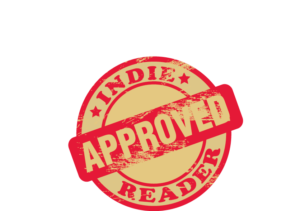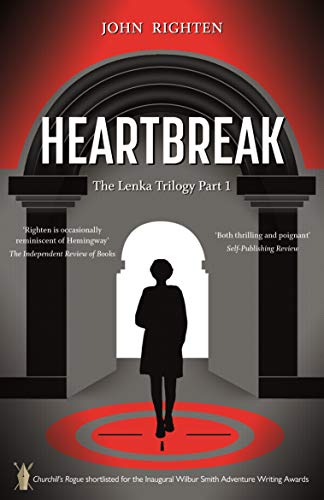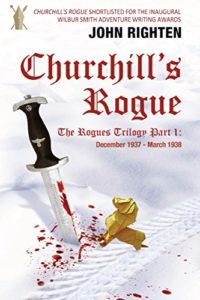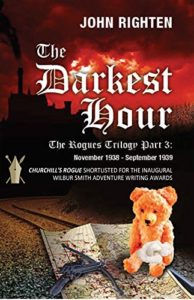
Heartbreak received a 4+ star review, making it an IndieReader Approved title.
Following find an interview with author John Righten.
What is the name of the book and when was it published?
Heartbreak published Black Friday 29th November 2019.
What’s the book’s first line?
‘Captain, the Cheshire Regiment have reported that there is a truck on the road to Tuzla,’ said the radio operative. To everyone’s surprise, it is not part of the exodus of refugees fleeing over the border but is intending to enter the war-zone.
What’s the book about? Give us the “pitch”.
Lenka Brett, a smart but unworldly, young, Irish teacher, volunteers to deliver medical aid when the world learns of the horrifying plight of children in Romanian orphanages. An English naval officer, Captain Simon Trevelyan, volunteers to be her co-driver. Together, they join a convoy of humanitarian aid drivers known as the Rogues, the last hope for those in areas where official charities cannot enter. Lenka falls in love with one of the drivers, but when the Rogues become the target of mercenaries, tragedy follows, and she discovers her lover is not who he appeared to be.
What inspired you to write the book? A particular person? An event?
I was part of the first humanitarian aid convoys to deliver medicine to orphanages and hospitals in Romania in the 1990s and later to Bosnia, during the war. The roguish characters who helped me get the aid through were the inspiration to pen Heartbreak.
What’s the main reason someone should really read this book?
It’s a fast-paced thriller, but delves into subjects that are relevant today, for example the role of the individual in a world of superpower politics and the plight of refugees caught in wars not of their making. Also, despite the harrowing situations that the ‘Rogues’, as I call them, encounter, it has moments of gallows humour – a key element for those like myself, to help us deal with the horror of what we encountered in Romania, Bosnia and later South America.
What’s the most distinctive thing about the main character?
Lenka has steel, and this becomes more apparent as her tale unfolds, particularly to those who underestimate her because she is young, a woman and attractive.
Who-real or fictional-would you say the character reminds you of?
Any young woman walking down the street, but with the deceptive resilience and guile of Stieg Larsson’s Lisbeth Salander.
If they made your book into a movie, who would you like to see play the main character(s)?
Daisy Ridley as Lenka, Idris Elba as Klay, Melissa McCarthy as ‘Holey’ Mary, Sir Anthony Hopkins as ‘Foxy’, Benedict Cumberbatch as Simon and Michael Fassbender as Connor.
When did you first decide to become an author?
For twenty years, I kept notes and clippings of the ‘Rogues’ I met and their stories. Many of the Rogues I knew died too soon, due to drug or alcohol addiction, suicide, or were killed during the convoys. For those who survived, the mental health impacts of what they witnessed cost many of them their jobs and their families, leading some to withdraw from ‘civilised’ society. In 2012, I decided to write a humorous autobiography, The Benevolence of Rogues, so their families, particularly their children, knew how special their parents were.
Is this the first book you’ve written?
No. I followed Benevolence with The Rogues Trilogy, where several roguish (that word again) characters tried to help Jewish families flee the Nazis on the eve of WWII. The first novel in the trilogy, Churchill’s Rogue, was shortlisted for the prestigious Wilbur Smith Inaugural Adventure Awards. I followed this with The Lochran Trilogy based in the 1960s, a series of thrillers in which the son of one of the original Rogues must discover why someone is trying to ignite a war by assassinating Sir Winston Churchill, a man the world knows is dying. Heartbreak is the first novel in The Lenka Trilogy, which will complete my trilogy of trilogies covering the most turbulent century in the history of humanity. I have also written The Pane (deliberate misspelling) of Rejection, in which this author and a fictional critic spar, providing a wry insight on writing, publishing and dealing with the critics.
What do you do for work when you’re not writing?
I work on several major infrastructure projects.
How much time do you generally spend on your writing?
I write most nights (I have a young family) between the hours of 2 and 4am.
What’s the best and the hardest part of being an indie?
The first forensic edit, as I know that in my case this will be the first of ten or more. Thankfully, my wife and a close circle of friends, including a professional editor, help steer the editorial pen.
What’s a great piece of advice that you can share with fellow indie authors?
Get on with it. Craft your dream onto paper, all of it. But before you release it, be ruthless, and ensure that the quality of your work is not just as good, but better than that you would find on the shelf of a high street bookshop. I say better, because if you don’t believe your novel will draw readers to it, rather than one of the other 6,000 plus novels published every week, why should anyone else believe it’s worth buying?
Would you go traditional if a publisher came calling? If so, why?
Of course. Why not call on experts in the publishing industry to help you improve your work and put it in the hands of more readers?
Is there something in particular that motivates you (fame? fortune?).
I enjoy the entire writing experience. From that first day sketching out the story, to weaving in the themes and twists in the plot – before several ruthless edits – and, finally, sharing my work with readers and gauging their reaction. One of my greatest joys, was when I saw a woman on a train reading what appeared to be the final pages of The Darkest Hour, the final book in The Rogues Trilogy. I was waiting to see if she would smile at the final twist in the last line – and to my delight, she did. I had turned an idea in my head into a book, which a year later put a smile stranger’s face. That’s my motivation.
Which writer, living or dead, do you most admire?
I’m a huge fan (and not just because of my growing waistline) of the late Iain Banks.
Which book do you wish you could have written?
Hilary Mantel’s A Place of Greater Safety. The plotting of the tensions between characters who were friends at the start of the French Revolution, that led some to the gallows while others released the trap door, is superb writing. Before Danton placed his head beneath the guillotine’s blade, he declared that his decapitated head – he was known for his ugliness – should be held up to the crowd, as “it’s worth looking at.” Now that’s gallows humour.


